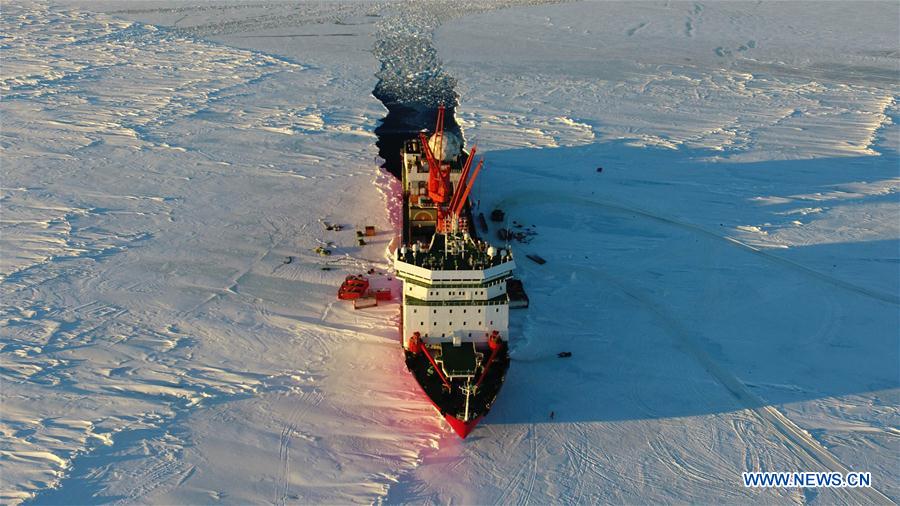
Aerial photo taken on Dec. 5, 2018 shows China's research icebreaker Xuelong in Antarctica./Xinhua
ABOARD XUELONG — Chinese icebreaker Xuelong with the 126 members of China’s 35th research mission to Antarctica on board ended a nine-day odyssey through the infamous “roaring forties” on Feb 22.
Xuelong is taking the Chinese researchers back to home. The voyage beginning on Feb 14 has turned out to be the longest and hardest of its altogether four travels through the westerlies during the research mission.
After leaving Prydz Bay by which the Chinese research base Zhongshan Station is located, the Chinese icebreaker almost immediately entered the westerlies.
“The westerlies usually are between 40 and 60 degrees south latitude, but this time the winds reached further to near 69 degrees south latitude, and that is where Prydz Bay and Zhongshan are,” said Xuelong’s Captain Shen Quan.
“We are currently north to the westerlies, but I’m afraid there is still a rocky, shaky journey ahead because of a tropical low pressure,” he added.
Xuelong’s northward route had been repeatedly revised and thus successfully averted gales and huge waves as high as 8 meters, according to the weatherman aboard the ship, Wang Lei.
For example, with no ice areas in Prydz Bay to shelter the ship, Xuelong had to depart from Zhongshan one day earlier than scheduled in order not be blocked by a whole gale and huge waves. After leaving the bay, it was first headed northwest to the marine-based west Antarctic ice sheet.
“Then a strong cyclone is moving to us and its resulting waves will block our way to north,” Wang said.
Due to the weather, Xuelong chose to sail westward at the edge of the westerlies to reach a haven area between two moving cyclones, where it had spent two days before huge waves again blocked its way northward.
“After that, Xuelong had spent about 20 hours in waters east to the Kerguelan Islands in order to stay away from the winds and waves on Feb 20,” Shen said.
After the winds and waves became smaller on Feb 21, Xuelong sailed northward and on Feb 22 passed through the westerlies at last.
On the morning of Feb 23, a tropical low pressure moving rapidly eastward affected Xuelong’s navigation, causing storms and around 3.5-meter-high swells in the sea.
Xuelong is expected to sail out of the low pressure area and enter calmer waters later in Feb 23. It is scheduled to be back to Shanghai in mid-March.
During this mission to Antarctica, Xuelong left Shanghai on Nov 2 and arrived at Zhongshan Station on Nov 30.


